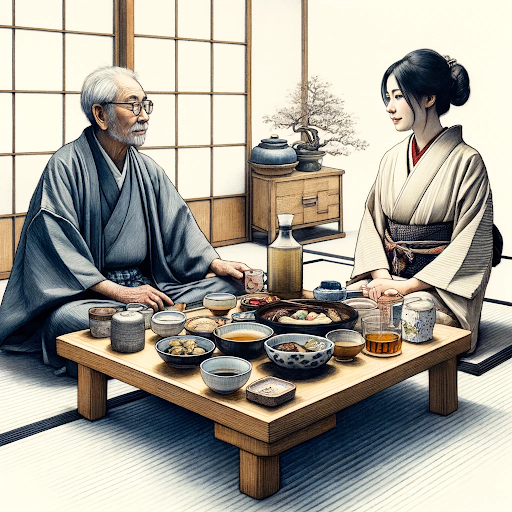It's called "hara hachi bu":
An ancient Confucian teaching that instructs people to eat until they're 80% full.
The Okinawans have practiced this for centuries. Average lifespan in Okinawa:
80.27 for men and 87.44 for women.
An ancient Confucian teaching that instructs people to eat until they're 80% full.
The Okinawans have practiced this for centuries. Average lifespan in Okinawa:
80.27 for men and 87.44 for women.
There's an old Chinese proverb that sums it up:
"Eat until you are eight parts (out of ten) full, and you will live long.
Eat until you are nine parts full, and you invite disease."
In other words, the first 80% of your meal sustains you. The last 20% sustains your doctor.
"Eat until you are eight parts (out of ten) full, and you will live long.
Eat until you are nine parts full, and you invite disease."
In other words, the first 80% of your meal sustains you. The last 20% sustains your doctor.

Overeating strains our bodies over time.
By constantly stretching our stomachs to capacity, we require more and more food to feel satiated.
Hara hachi bu: training ourselves to be satisfied with less. To eat mindfully and stop before we're stuffed.
@hubermanlab says:
By constantly stretching our stomachs to capacity, we require more and more food to feel satiated.
Hara hachi bu: training ourselves to be satisfied with less. To eat mindfully and stop before we're stuffed.
@hubermanlab says:
So what does 80% full feel like?
You'll still feel a twinge of hunger, but it should subside within an hour.
If you're used to that uncomfortable "Thanksgiving-full" feeling, 80% might take some getting used to.
Your goal: train your brain to recognize true satiety.
You'll still feel a twinge of hunger, but it should subside within an hour.
If you're used to that uncomfortable "Thanksgiving-full" feeling, 80% might take some getting used to.
Your goal: train your brain to recognize true satiety.
Another key: hara hachi bu helps you distinguish true physiological hunger from cravings or "brain reward" eating.
Ask yourself: would a handful of nuts satisfy me right now? If yes, you're likely hungry.
If only that chocolate cake would do, it's probably a craving.
Ask yourself: would a handful of nuts satisfy me right now? If yes, you're likely hungry.
If only that chocolate cake would do, it's probably a craving.
The science backs this up. Studies show that significant calorie restriction can extend lifespan in animals.
Okinawans typically consume ~1800-1900 calories per day, and maintain lean physiques well into old age.
Delaying stomach stretch may be one reason why.
Okinawans typically consume ~1800-1900 calories per day, and maintain lean physiques well into old age.
Delaying stomach stretch may be one reason why.
To put hara hachi bu into practice:
• Eat slowly, put your utensils down between bites
• Take 20+ minutes to finish a meal
• Drink water to aid fullness
• Choose nutrient-dense foods like veggies, beans, and nuts
• Tune into your body's cues as you eat
• Eat slowly, put your utensils down between bites
• Take 20+ minutes to finish a meal
• Drink water to aid fullness
• Choose nutrient-dense foods like veggies, beans, and nuts
• Tune into your body's cues as you eat
This 80% principle goes beyond just food.
It's about leaving space in all areas of life. Not overscheduling, overcommitting, or chasing perfection.
Go with the flow and embrace spontaneity. Leaving room for serendipity.
@DrJustinSung says it well:
It's about leaving space in all areas of life. Not overscheduling, overcommitting, or chasing perfection.
Go with the flow and embrace spontaneity. Leaving room for serendipity.
@DrJustinSung says it well:
The 80% rule isn't about restriction. It's about freedom.
Freedom from a lifetime of stretching your stomach and your lifespan.
Freedom to enjoy food and life more mindfully.
Freedom to focus your energy on what truly matters.
Freedom from a lifetime of stretching your stomach and your lifespan.
Freedom to enjoy food and life more mindfully.
Freedom to focus your energy on what truly matters.
Hara hachi bu doesn't just add years to your life. It adds life to your years.
By preserving the quality of our extended lifespans, it helps make those
bonus years worth living.
The best part? You can start living by this principle today. One mindful bite at a time.
By preserving the quality of our extended lifespans, it helps make those
bonus years worth living.
The best part? You can start living by this principle today. One mindful bite at a time.
P.S If you want to create viral content like this, we’re launching a FREE newsletter.
We will teach you how we generate 60M+ impressions per month for our clients.
Join the list today: thoughtleadr.ck.page/905c7f03d5
We will teach you how we generate 60M+ impressions per month for our clients.
Join the list today: thoughtleadr.ck.page/905c7f03d5
Special thanks to the creators whose insights made this thread possible:
@hubermanlab
@DrJustinSung
Health Is Wealth
TED-Ed
@hubermanlab
@DrJustinSung
Health Is Wealth
TED-Ed
• • •
Missing some Tweet in this thread? You can try to
force a refresh
















